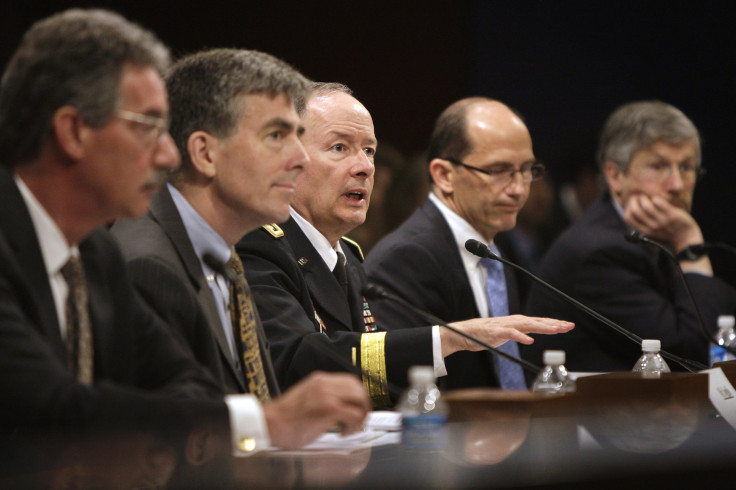NSA FISA Controversy: The Message War Over The Importance Of The Metadata Program

When former intelligence contractor Edward Snowden revealed the National Security Agency’s sweeping collection of Americans’ phone records, the administration rushed to justify the program as essential to national security. In congressional hearings, government officials spoke about the program as crucial to preventing another Sept. 11, 2001.
As members of Congress begin to turn serious attention to the phone data program -- buoyed by growing, bipartisan concern in the House of Representatives -- this debate over its supposed necessity will become critical. In order to maintain the program, supporters must convince their colleagues and the American public that ending the bulk collection of "metadata" would be dangerous. On the other side of the argument, opponents of the program have begun to push the idea that it does not provide enough protection to justify intruding on Americans’ privacy.
But there’s a catch: The ultimate evidence of who is right and who is wrong is top secret. As this debate heats up, the public will have to decide whom to believe with only a vague set of facts to guide them, making each side’s persuasiveness particularly important.
So far, intelligence officials have tried to describe the surveillance program’s effectiveness in broad strokes but failed to make strong assertions about its necessity, reverting instead to comments about the need to “connect the dots.” During a House Intelligence Committee hearing last month, NSA Director Gen. Keith Alexander indicated that the program had contributed to thwarting about 10 terrorist plots out of the more than 50 cases officials have cited as evidence of effectiveness. Officials have repeatedly cited one case in particular, in which the FBI says it was able to capture a San Diego man sending resources to a terrorist network in Somalia. At a Senate Judiciary Committee hearing last month, Robert Mueller, the bureau's outgoing director, declined to comment on how crucial the program was to thwarting these attacks: “I think it’s very difficult to judge a program in that particular way,” he said.
Lawmakers trying to defend the mass spying, however, have used stronger language in arguing that it is crucial to U.S. counterterrorism efforts. In a 15-minute floor debate last Wednesday over a proposed measure to halt the metadata program, those in favor of keeping it used heightened language about the national security risk of ending the bulk collection. The attempt failed by a vote of 217-205, which sent a signal that Congress is still not at ease with the program.
“Fifty-four times this and the other programs stopped and thwarted terrorist attacks both here and in Europe -- saving real lives,” House Intelligence Committee Chairman Mike Rogers, R-Mich., said. “This isn't a game. This is real. It will have a real consequence. This is hard.”
This program has “saved untold American lives,” said Rep. Tom Cotton, R-Ark. “We're at war. Do not take this tool away from our warriors on the front line.”
On the other side of the debate, lawmakers who want to roll back the NSA program and limit data collection to numbers connected to a specific terrorist investigation, rather than acquiring everyone's records in bulk, argue that the pervasive intrusion is actually not as effective as the government says it is.
In the last several days, two senators leading the push to end the program, Ron Wyden, D-Ore., and Mark Udall, D-Colo., have been making the case that the phone records program could be scaled back without harming national security. To make their point, they cite a former NSA program that collected data in bulk on Americans’ Internet use before being discontinued in 2011. “Concerned about this program’s impact on Americans’ civil liberties and privacy rights, we spent a significant portion of 2011 pressing intelligence officials to provide evidence of its usefulness,” Wyden and Udall wrote in an op-ed published in the Washington Post last Friday. “They were not able to do so, and it was shut down that year.” That program lasted 10 years.
“[I]n our view, the NSA has not demonstrated that it is necessary for innocent Americans to give up their privacy when it comes to their phone records,” they wrote.
Pressing the intelligence agencies for evidence of the necessity of the data sweep, in June Wyden and Udall sent a letter to James Clapper, director of national intelligence, asking for proof. Clapper responded to their request last Friday, sending both a classified and declassified version of a letter. Clapper’s response cited two previously disclosed cases in which the metadata program helped disrupt terrorist activity, and referred Wyden and Udall to the classified supplement for more examples.
Wyden and Udall also asked Clapper if there were any instances in which the phone records program led to useful intelligence that would not have been available without bulk collection. The answer to that question was entirely classified.
But the classified responses from Clapper did not convince Wyden and Udall that the program is necessary to anti-terrorism efforts. “Given the implications for the privacy of the millions of law-abiding Americans, intelligence leaders were specifically asked to demonstrate the unique value of the bulk phone records collection program,” the two senators wrote in a joint response to Clapper’s letter. “They did not.”
“Instead, they persist in citing two cases where the government could have obtained a court order or emergency authorization for the information it needed,” they continued. “The bottom line is we still have yet to see concrete evidence that the dragnet collection of phone records provides any unique value.”
As intelligence officials will continue to testify about the programs on Capitol Hill, including a Senate Judiciary Committee hearing on Wednesday, questions about the particular usefulness of this program are likely to come up again and again -- and the answers could prove critical to whether lawmakers decide to take on this program seriously after the August recess.
© Copyright IBTimes 2024. All rights reserved.






















